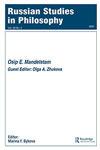Back to Martin Heidegger’s Black Notebooks
IF 0.1
4区 哲学
Q4 Arts and Humanities
引用次数: 0
Abstract
ABSTRACT This article analyzes a number of personal and philosophical aspects of the debate over Heidegger’s Black Notebooks and his anti-Semitism. The first part of the article focuses on the personal features that influenced Heidegger’s social activities, as well as his statements on politics and culture. These features are then illustrated by examples of radical, stereotypical characterizations of “national essences” in the Black Notebooks. The final part of the article focuses on the role of the Black Notebooks in the context of Heidegger’s philosophical development, primarily the causes and consequences of his turn toward a new philosophy of Being. The contemporary debates on the Black Notebooks rightly point to the extreme biasedness of Heidegger’s statements formulated there, which is used as a justification for attempts to discredit his previous work and ideas. My core thesis is that while the views Heidegger expresses in the Black Notebooks undoubtedly deserve harsh criticism, they should not serve as a basis for contemporary scholars to reject the significance of Heidegger’s entire legacy.回到马丁·海德格尔的《黑色笔记
摘要本文分析了关于海德格尔《黑色笔记》及其反犹太主义的争论的一些个人和哲学方面。文章的第一部分着重论述了影响海德格尔社会活动的个人特征,以及他对政治和文化的论述。这些特征随后通过黑人笔记中对“民族本质”的激进、刻板的描述来说明。文章的最后一部分着重论述了黑笔记在海德格尔哲学发展中的作用,主要是他转向新存在哲学的原因和后果。当代关于《黑色笔记》的辩论正确地指出了海德格尔在那里表述的极端偏见,这被用来为试图诋毁他以前的作品和思想辩护。我的核心论点是,尽管海德格尔在《黑色笔记》中表达的观点无疑值得严厉批评,但它们不应成为当代学者拒绝接受海德格尔整个遗产意义的基础。
本文章由计算机程序翻译,如有差异,请以英文原文为准。
求助全文
约1分钟内获得全文
求助全文
来源期刊

RUSSIAN STUDIES IN PHILOSOPHY
PHILOSOPHY-
CiteScore
0.10
自引率
0.00%
发文量
14
期刊介绍:
Russian Studies in Philosophy publishes thematic issues featuring selected scholarly papers from conferences and joint research projects as well as from the leading Russian-language journals in philosophy. Thematic coverage ranges over significant theoretical topics as well as topics in the history of philosophy, both European and Russian, including issues focused on institutions, schools, and figures such as Bakhtin, Fedorov, Leontev, Losev, Rozanov, Solovev, and Zinovev.
 求助内容:
求助内容: 应助结果提醒方式:
应助结果提醒方式:


